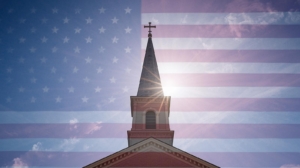In the modern period, particularly in the twentieth century, many Reformed folk became uneasy with the traditional Reformed language concerning natural law. As one who began to enter the Reformed world circa 1980, I mostly found Reformed people to be hostile to . . . Continue reading →
Recovering the Reformed Confession
On Theocracy
I have explained at great length here why those who deny our covenant theology, our hermeneutics, and our doctrine of the sacraments are not Reformed. All the Reformed confessions of the sixteenth and seventeenth centuries teach paedobaptism and denounce the rejection of . . . Continue reading →
Dare To Be On The Daniel Plan?
The song “Dare to Be a Daniel” is yet another reason to adopt Mr. Murray’s view that, in public worship, we should sing only God’s Word (I reached the same conclusion in Recovering the Reformed Confession).1 Not only is the song itself . . . Continue reading →
Review: Reformed Confessionalism By D. Blair Smith
When the strongest criticism I can make of a book is that the author used an obscure word (complexify, 45) that says something about the strength of a work.1 Let me say at the outset, I really like this book. This is . . . Continue reading →
If We Don’t Do X, The Young People Will Leave
It is trite, but just in case you have not heard the story: During the Vietnam War, a Marine Corps colonel is reported to have said, “We had to destroy the village in order to save it.”1 An analogy to this approach . . . Continue reading →
James K. A. Smith’s Bad Argument Is An Indicator Of Improving Health In The CRC
Regular readers of this space are aware that there is something of a confessional renaissance within the Christian Reformed Church in North America. For example, in 2023, Synod rejected decisively an appeal by a prominent progressive CRC congregation against Synod’s decision upholding . . . Continue reading →
Review: The Gospel in the Stars By Joseph A. Seiss
In 1882 the Lutheran minister Joseph A. Seiss (1823–1904) published the provocative volume, The Gospel in the Stars, Or, Prímeval Astronomy (Philadelphia: E. Claxton & company, 1882). Evidently, it found an audience, and it has been reprinted as recently as the early 1970s and . . . Continue reading →
“Bound To The Past” And To A Living Confession
In reaction to Rick Phillips’ critique of a response by a Federal Visionist to his (then) presbytery, one of the proponents of the Federal Vision made the following argument: Surely, we all know there’s a difference between how we use terms in . . . Continue reading →
Geocentrism Anyone?
It is no longer revolutionary (no pun intended) to hold that the earth revolves around the sun, but it was not always so. The observation of Nicholas Copernicus (1473–1543), that the universe is heliocentric (sun-centered) and not geocentric (earth-centered) was met with . . . Continue reading →
The Black Rubric And The Creator-Creature Distinction
The “Black Rubric” was so-called because it was set in black print in the 1661–1662 edition of the Book of Common Prayer. It was first inserted into the Second Edwardian Prayer Book in 1552. It was intended to explain that when communicants . . . Continue reading →
The Fork In The Road For The “New Calvinists”
Thanks to Darryl Hart for pointing us to this challenging essay by Dale Coulter, who self identifies as a “Classical Pentecostal” in the holiness tradition.1 He writes on the official blog of the Regent University School of Divinity. He favors the Edwardsean . . . Continue reading →
Uma Defesa da Membresia Confessional
Quem pode se juntar à igreja de Cristo e sob quais condições? Esta é uma pergunta que, às vezes, agitou a igreja. No período moderno, a maioria das igrejas, incluindo as igrejas confessionais presbiterianas e reformadas (P&R), tende a adotar uma posição . . . Continue reading →
New: Resources On Confessional Subscription
The Christian church has always had a confession or a creed. There are creeds in Scripture itself, e.g., Deuteronomy 6:4, “Hear O Israel, Yahweh our God, Yahweh is one.” This was recited in the synagogue as a confession of faith and it . . . Continue reading →
The Mystery Of Children’s Church
I can understand why evangelicals and others who do not have a covenantal theology would exile their children during public worship, but I do not understand why so many ostensibly Reformed congregations have adopted the practice of dismissing their covenant children from . . . Continue reading →
Is Reformed Confessionalism Impious?
One of the earliest and most rhetorically powerful charges made by the proponents of the eighteenth-century (colonial) revivals was that their critics were either unregenerate or impious. Religious experience is usually defined by proponents of revival as being composed of certain religious . . . Continue reading →
Is Reformed Theology “Isolationist?”
One of the many criticisms John Frame makes of Recovering the Reformed Confession is that it advocates a closed, isolationist, elitist view of the Reformed faith in order to exclude others unnecessarily and wrongly.1 Jerry Owen, a commentator on Frame’s review, asks, . . . Continue reading →
Sempre abusando de semper reformanda
As igrejas reformadas têm alguns slogans maravilhosos que são repletos de verdades importantes. Às vezes, no entanto, esses slogans podem ser mal interpretados, mal comunicados e mal compreendidos. Com a possível exceção de Sola Scriptura (a Escritura somente), nenhum desses slogans foi mais frequentemente deturpado com maior prejuízo do que ecclesia . . . Continue reading →
Reformado & Pentecostal?
James K. A. Smith tem uma interessante postagem na Christianity Today: Teaching a Calvinist to Dance.[1] Neste texto ele diz que anseia por um “tipo de espiritualidade reformada ‘pentecostalizada’”. Ele continua a vincular a sua busca com a de Edwards. Isso pode . . . Continue reading →
Ping-Pong Evangelicals And Middle Knowledge
Paul Helm blogs monthly and substantively. A certain entry concerns the question of God’s so-called “middle knowledge” (media scientia). He writes, I’ve heard it said that many Calvinist writers currently favor some form of the doctrine of middle knowledge. I’ve also heard . . . Continue reading →
Fencing The Table Or The Scandal Of The Church
Perhaps nothing so scandalizes the contemporary (i.e., modern) church as the attempt by the visible church to obey the teaching of Jesus and the teaching of the Apostles concerning the Lord’s Table. I say this for three reasons: 1) recently I have . . . Continue reading →



![baptism fin [recovered]](https://heidelblog.s3.us-west-1.amazonaws.com/wp-content/uploads/2025/06/18153622/Smith_Reformed_Confessionalism-300x420.jpg)











